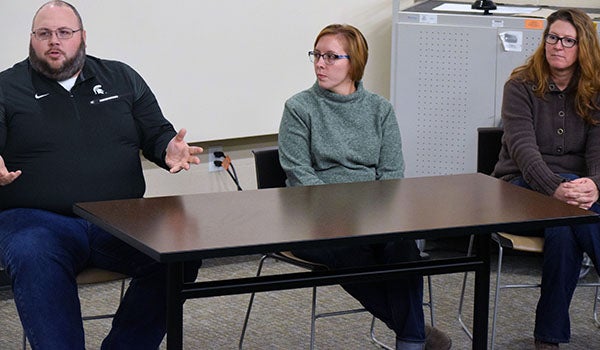SMC Collegiate Farm Bureau examines career options
Published 8:31 am Tuesday, November 19, 2019
DOWAGIAC — Southwestern Michigan College Collegiate Farm Bureau members heard career pointers Nov. 11 from professionals who included a recent SMC graduate.
Kylie (Oldenburg) Rau, of White Pigeon, blended her love for science and family evergreen nursery background for a laboratory technician position at Agdia’s Elkhart diagnostic center.
Rau, Constantine’s 2010 salutatorian, graduated from SMC in 2012, then added a Western Michigan University bachelor’s degree in chemical engineering.
As SMC’s 2015 honors program speaker, Rau talked about working at the nursery her forebears founded more than 60 years before.
“That’s where I acquired my strong work ethic, values and love for being with family in the outdoors,” she said. “SMC shaped my life. I thoroughly enjoyed my time at SMC.”
She spent her time at SMC studying chemistry with Jackie Perry, physics with Andrew Dohm and mathematics with Dr. Keith Howell.
Jonathan LaPorte, a Michigan State University Extension farm management educator covering a 10-county area from Cass County’s office in his hometown, Cassopolis, and horticulturist Stacey Rocklin, program coordinator for the Michigan State University Institute of Agricultural Technology at SMC, rounded out the panel.
Agdia, founded in 1981, provides diagnostic products and services for detecting plant pathogens which can cause disease symptoms that reduce productivity, quality and even kill plants.
“It’s important to stress to farmers and growers that they need to test their plants,” Rau said. “I love my job! No matter what you do, have passion and be excited. No experience is wasted building on what you have. My degree is not anywhere near agriculture, but I loved growing up on the farm. I also love science and chemistry and anything lab-related. No matter what degree you get, it’s important how you communicate — learning to talk to people and being able to convey your thoughts efficiently. Don’t let the title of your degree hold you back from options out there. Most of my co-workers in an agricultural lab do not have any agricultural experience. One was in natural resources to work for the DNR, others studied biology, chemistry and ag business.”
LaPorte specializes in farm business analysis, business transition, income tax education and general farm business management topics such as economics of technologies and return on investment. Previously, LaPorte worked six years for the U.S. Department of Agriculture as a farm loan officer and three-and-a-half years as a certified crop advisor at a farm retail cooperative. He continued to be involved in his family’s small cash crop operation, raising corn and soybeans, but is currently focused on finishing his Kansas State University master’s degree. LaPorte’s MSU degree was in agribusiness management, emphasizing agronomy.
“Business touches every aspect of agriculture,” LaPorte said. “Jobs are out there. It’s just a matter of finding one that fits.”
LaPorte started college interested in working in agricultural communications, such as radio broadcasting.
“I was big into FFA, so I also thought about working with students as an ag teacher. I took some winding roads to get where I’m at,” he said, “but I’m still pursuing things I was interested in years ago. One mistake people make is applying for everything they can think of because they need a job instead of narrowing down what they like. People asking questions at interviews can tell when that individual across from them is passionate about working in that field. That’s a big key to getting hired.”
Rocklin entered MSU “intending to leave the farm” and perhaps becoming a writer or art historian, but was too restless for the prolonged sitting writing demanded. She embraced her plant science “fascination” instead.
“I worked in commercial greenhouses for the first nine or 10 years of my career,” Rocklin said. “[Then I] decided to do something else. My mom said I should work in a bank, so I tried that. Don’t underestimate yourself. Everything you learn is something more you can do. Shy young women like myself tend to stay in positions too long when you’ve learned all you can and it’s time to
move on.”







